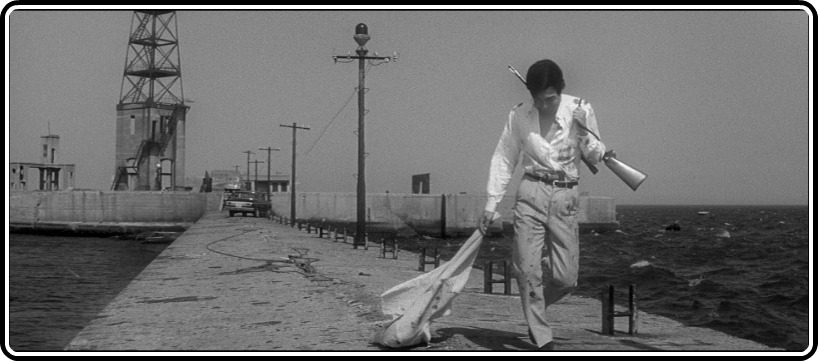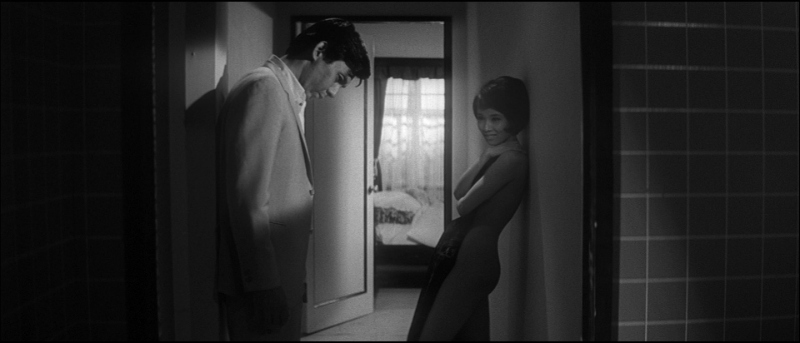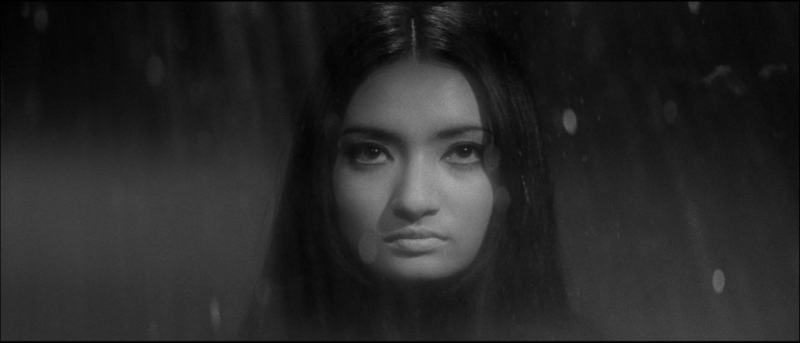
I have seen Branded to Kill three times now, and though I could offer, offhand, a brief and fairly accurate plot synopsis, many of the details still escape me. Characters seem to teleport, not just to and from places, but to new ways of being, and new ways of relating to one another. Rooms transform and react to their presence. Even the weather becomes an outer reflection of their inner desires.
It’s an art film, if you like. It also makes no God damn sense. And we are better for it.
See if this sounds familiar – a major film studio puts a film into production, only to decide at the last minute that they hated the script, but are sticking the predetermined release date. They bring on a prolific director from their stock company, who they think little more than a “journeyman,” to rewrite the film with more than a half-dozen other people, and eventually direct it. Sounds like standard operating procedure in Hollywood these days, yes? Rather than waste a lot of time trying to make a regular movie with “well-rounded characters” who have “goals” and who operate within a “narrative framework” in “believable ways,” however, Seijun Suzuki figures whatever he comes up with the night before a given shoot date is better than anything he could plan, and that the only person who should have any idea what’s going on in the film is the director. He decides the actors can do pretty much whatever they please with their roles.

Nikkatsu, the studio, had warned Suzuki to toe the company line. With Branded to Kill, he effectively urinated on it, erasing it in the most vulgar ways he knew how. Branded to Kill has more than enough sex and violence to accommodate a studio desperate to draw audiences away from television, but the violence is often removed from an action context, and the sex is a little bit kinkier than was typical, even at that especially wild time in Japan. After all, the protagonist is a hit man, hungry to kill, who gets aroused by the smell of steamed rice. His wife craves his affection. He craves the affection of a suicidal dame, who accurately observes that he wouldn’t dare kill her before he screws her. And with that combination, how enjoyable could the sex really be?
This is all fairly parenthetical to the film’s real joy, which is precisely what Suzuki felt it to be – pure surrealist invention. Nobody else could have made Branded to Kill. It is very likely that nobody else has made a film even remotely like it. Every shot seems to have been crafted from an exquisite corpse exercise. The film is said to have been edited in a single day, due to Suzuki’s habit of only shooting what was absolutely necessary. Perhaps he simply kept barreling forward, never reconsidering or dwelling on his options. The shot was right because it was done. In this way, as ostentatious as it is for a film of its size, it’s as stripped-down and pure as they come. It’s funky and sexy and salacious and a little unclean.

The new Blu-ray from Arrow Films, however could certainly not be called “unclean.” As the booklet admits, the transfer comes directly from Criterion’s own transfer of the film; I don’t have that Blu-ray, but based on comparisons available, it seems that they are largely indistinguishable. In any case, it’s an outstanding presentation – depth, contrast, and detail all shine, giving Kazue Nagatsuka’s cinematography the thorough consideration it deserves. There’s something particularly pleasing about black-and-white anamorphic widescreen films, and, in turn, the Japanese film industry in the 1960s is a treasure trove of outstandingly gorgeous compositions. Even within that rarified field, Branded to Kill stands out, offering images that are impossible to forget, and dynamic perspectives on (relatively) familiar situations. It’s the sort of film Blu-ray was invented to support.
While Arrow Films has borrowed Criterion’s transfer, they have eclipsed the American company when it comes to supplements. They provide two archival interviews with Suzuki and star Jo Shishido (though the latter isn’t quite as entertaining as Criterion’s entry, during which the actor draws a gun on his interviewers), as well as the rather surprising inclusion of Trapped in Lust, a “porno re-imagining” of Branded to Kill, directed by one of that film’s screenwriters. It certainly goes further in the sex department than Suzuki’s original, though not as outrageously far as one might imagine, given that set-up and the already-quite-explicit film on which it is riffing. It’s presented in a pretty nice high-definition transfer itself, a little flatter than the main feature, with slightly faded colors, but it’s still a much finer presentation than one could ever reasonably expect such a film to receive, so kudos for that. A handsome booklet is also provided, with an essay by Jasper Sharp and new artwork by Ian MacEwan (not the Atonement guy).
What more can one say about a film like Branded to Kill? It is wonderful. Seek it out.


